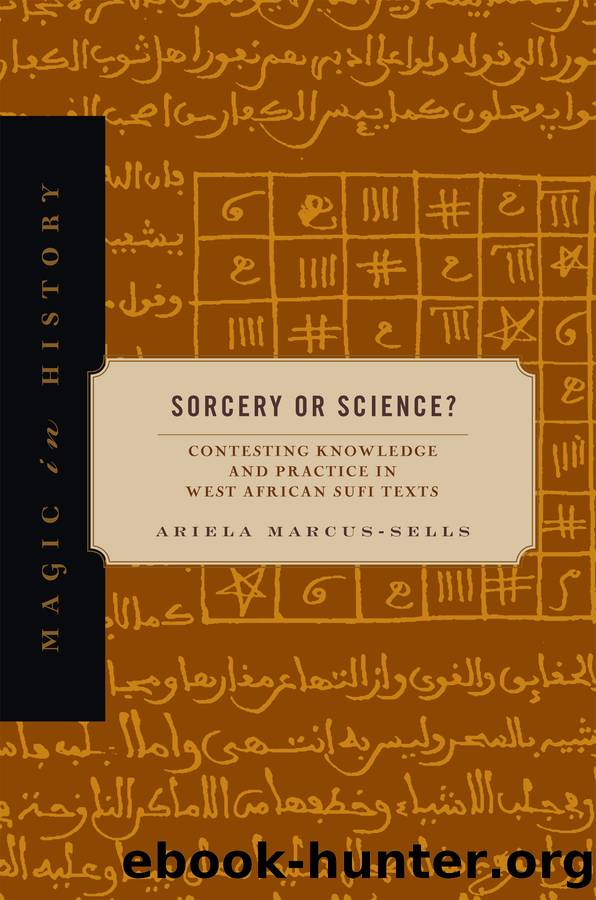Sorcery or Science? by Ariela Marcus-Sells

Author:Ariela Marcus-Sells
Language: eng
Format: epub
Publisher: Penn State University Press
Published: 2022-02-17T00:00:00+00:00
Etic Engagements
The previous two sections began with the Kunta scholars as interlocutors and examined the emic, second-order categories that emerged from within their own texts. This section illustrates how uneasily the terms âreligion,â âscience,â and âmagicâ that developed in early modern western Europe map onto the Kuntaâs categories of âbreakings of the norm,â âsciences of the unseen,â and âsorcery.â First, European scholars used âmagicâ to designate a degraded or vestigial form of religion, and then to refer to a kind of flawed science. Meanwhile, in popular parlance, âmagicâ has come to designate an appeal to supernatural forces other than God. However, as we have seen, the Kunta scholars understood both the sciences of the unseen and sorcery to depend on the appropriate functioning of the ânormalâ operations of the world. It is the miracles of the prophets and the charismata of the friends of God, by contrast, that break free of the constraints of normalcy and the natural. The terminology developed in western Europe fails to work for this Muslim context in part because of an epistemic divide that separated western European elites from the knowledge/practices of their Renaissance counterparts. Max Weberâs theory of âdisenchantmentâ described a historical process in which Europeans came to understand God and religion as belonging to a spiritual place distinct and separate from the physical, knowable world. Science came to occupy the role of informing people about the physical world of the senses, while religion was confined to the spiritual realm andâbecause the spiritual was reconceived as fundamentally unknowableâwas presented as a matter of faith and doubt.43 In that the Kunta scholars understand the visible and invisible realms to be intimately and inextricably connected, their categories of knowledge/practice stand on the other side of the epistemological divide from the so-called Enlightenment elites. However, the idea of a disenchanted modernity has been the subject of much recent debate, and scholars such as Egil Asprem, Wouter Hanegraaff, and Jason Josephson-Storm have pushed back, arguing that âenchantedâ understandings of the world continued throughout the early modern and modern periods.44 Responding to their criticisms of the theory of disenchantment, Edward Bever and Randall Styers, as noted above, have posited that European modernity is defined by âa double gestureâ that reinscribes and revitalizes the sets of knowledge/practice that it seeks to banish.45 Although the specific meanings that European elites ascribed to the terms âmagicâ and âscienceâ do not apply to the context of the Kunta, the Kunta were very much involved in the discursive âdouble gestureâ of disavowal and reinscription that these scholars have attributed to Western modernity.
The remainder of this chapter situates the Kuntaâs classificatory system within two larger, etic contexts and seeks to destabilize the assumption that this âdouble gestureâ is restricted to modern Europe. I begin by mapping SÄ«di al-MukhtÄrâs and SÄ«di Muḥammadâs engagement with the sciences of the unseen onto the current state of knowledge concerning the history of these sciences in West Africa through the nineteenth century. Although research on this topic is still nascent,
Download
This site does not store any files on its server. We only index and link to content provided by other sites. Please contact the content providers to delete copyright contents if any and email us, we'll remove relevant links or contents immediately.
The Secret Power of Speaking God's Word by Joyce Meyer(3154)
Signature in the Cell: DNA and the Evidence for Intelligent Design by Stephen C. Meyer(3123)
Real Sex by Lauren F. Winner(3002)
The Holy Spirit by Billy Graham(2938)
The Gnostic Gospels by Pagels Elaine(2516)
Jesus by Paul Johnson(2349)
Devil, The by Almond Philip C(2323)
23:27 by H. L. Roberts(2244)
The Nativity by Geza Vermes(2221)
Chosen by God by R. C. Sproul(2157)
All Things New by John Eldredge(2149)
Angels of God: The Bible, the Church and the Heavenly Hosts by Mike Aquilina(1950)
The Return of the Gods by Erich von Daniken(1925)
Angels by Billy Graham(1916)
Knowing God by J.I. Packer(1847)
Jesus of Nazareth by Joseph Ratzinger(1798)
The Gnostic Gospel of St. Thomas by Tau Malachi(1780)
How To Be Born Again by Billy Graham(1775)
Evidence of the Afterlife by Jeffrey Long(1773)
